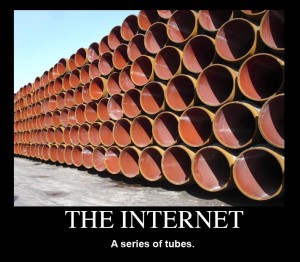
Hard on the heels of a New York Times profile indicating SC Senator Lindsey Graham can barely operate a toaster, much less do anything on Twitter and Facebook than let his staff handle it for him, a Politico article says technology policy is being made by members of Congress who are- by their own admission- clueless:
The need for that Washington-Silicon Valley mind-meld could not have been any more obvious than this May, when a House subcommittee began exploring ways to rewrite evidence rules that govern e-mails and documents stored in distant databases.
“I think I will acknowledge at the outset how ill-prepared technologically I feel to engage in this discussion,” Rep. Mel Watt (D-N.C.) told the House Judiciary subcommittee that handles civil liberties. “I feel like a Neanderthal in this area.”
He wasn’t alone. Rep. Bobby Scott (D-Va.) later asked one witness whether he could “look into Rep. Watt’s cloud” — the term that describes the practice of storing data and applications on third-party servers.
“No, no, no, no,” assured Jim Dempsey, the vice president for public policy at the Center for Democracy and Technology. He later found himself diluting his arguments about the Electronic Communications Privacy Act — the point of the hearing — with basic explanations of a practice that undergirds modern e-mail inboxes.
Watt later told POLITICO he planned to bulk up on that debate, as he has with other complex issues like financial regulatory reform. But, he stressed, “even for those who understand the technology, it’s moving too fast for them to keep up and keep the laws abreast.
“This stuff is moving so fast, I don’t even have a Facebook, I don’t Twitter, I had never heard of whatever that term was they were using [at the hearing],” he said, referring to the cloud computing confusion.
But the examples abound elsewhere. Take a 2008 hearing before the Senate Commerce Committee about privacy and online behavior-based advertising. The discussion seemed to fall apart when Sens. Tom Carper (D-Del.), Bill Nelson (D-Fla.) and others seemed not to understand the term “cookies.”
Lawmakers have since learned this one: Cookies allow websites to gear content to a Web user’s behavior. However, while the underlying privacy concerns expressed during that 2008 hearing have resonated across Capitol Hill for years, legislation addressing those gripes has hardly budged, though a new Internet privacy bill spearheaded by Boucher this year does show promise.
It was former Sen. Ted Stevens (R-Alaska), once the chairman of the Senate Commerce Committee, who famously described the Internet in 2006 as a “series of tubes.” But four years later, when that same panel considered the merger of Comcast and NBC, Sen. Mike Johanns (R-Neb.) admitted to his colleagues he used the Internet at most for an hour each day.
Even more recently, a June hearing on the FCC’s plan to rein in Internet companies became muddled after some House appropriators questioned whether the agency’s Net neutrality plans would allow child pornography to flourish. Not only is child pornography already illegal, it is not even the FCC that polices it — that has long been the chief responsibility of its cousin, the Federal Trade Commission.
No comments:
Post a Comment